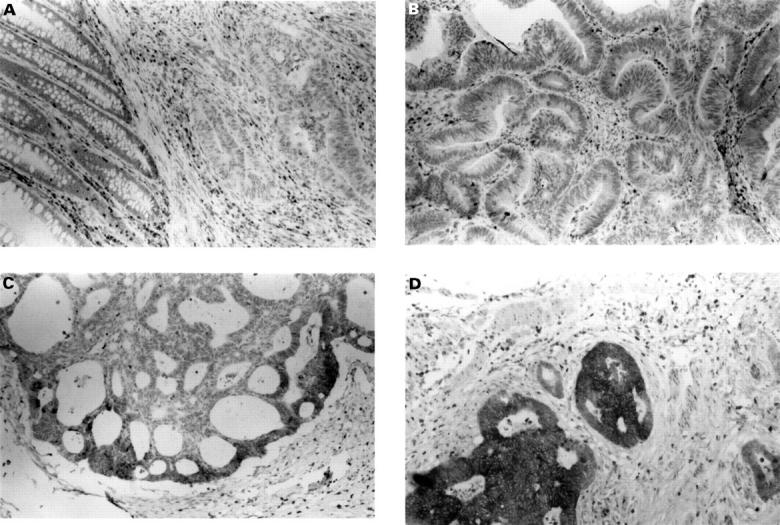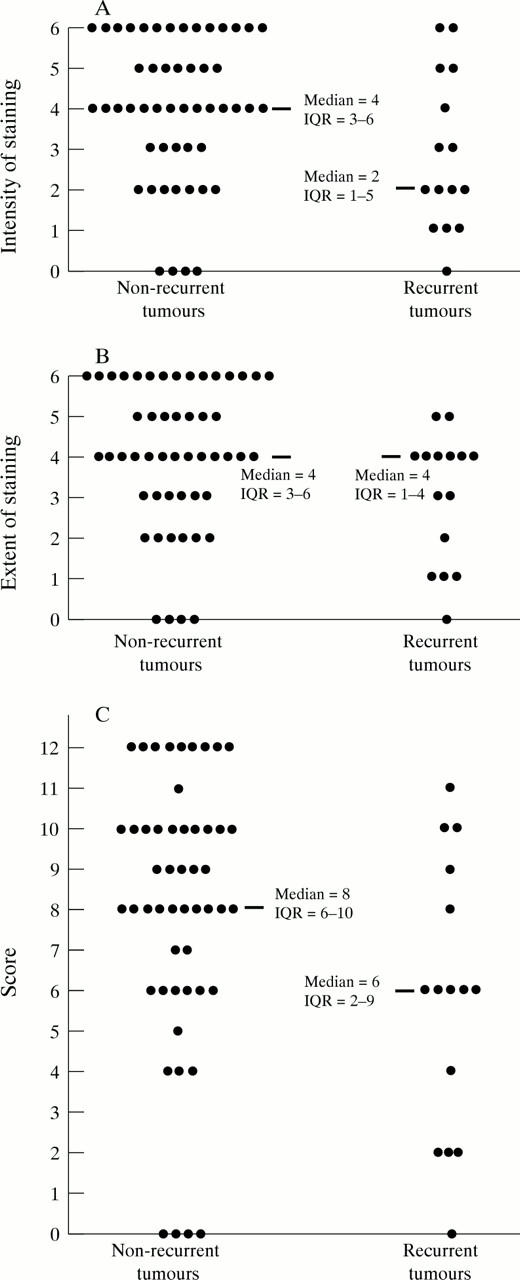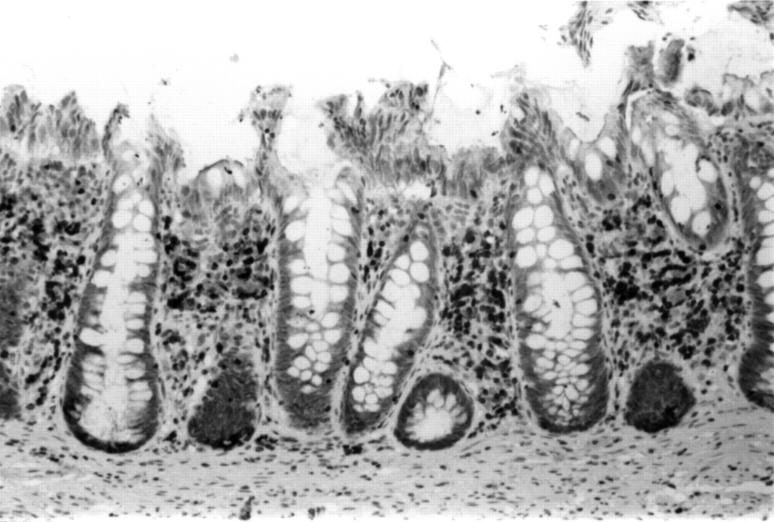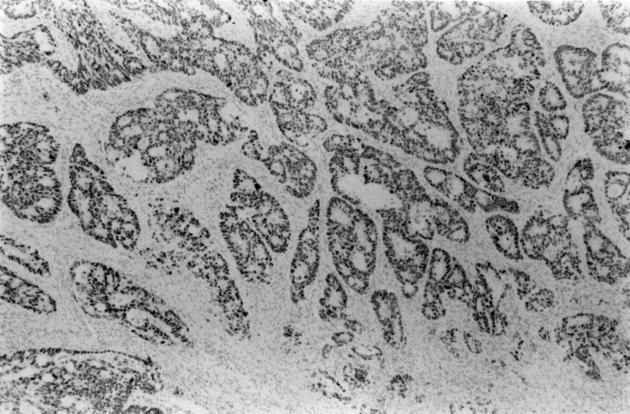Abstract
Aims—To investigate the association between immunohistochemical expression of Bcl-2 and p53 in colorectal cancer and tumour recurrence following surgery. Methods—Sixty six cases of Dukes' B colorectal carcinoma were studied. All tumours were moderately differentiated and were shown to be histologically clear of the resection margins. Immunohistochemistry was performed on formalin fixed paraffin wax embedded tissue using monoclonal antibodies for p53 and Bcl-2. The Bcl-2 staining was assessed separately for relative intensity of staining and percentage of positive tumour cells and given a final score which combined the two factors. The p53 staining was assessed on number of positive tumour cells only. The patterns of immunostaining of those cases in which there had been tumour recurrence were compared with those cases in which there was no tumour recurrence (controls). Results—A statistically significant inverse association was found between Bcl-2 score and tumour recurrence (median Bcl-2 score of 6 (interquartile range (IQR) 2-9) in patients with recurrent disease; median Bcl-2 score of 8 (IQR 6-10) in those without recurrence; p=0.03). When examined separately, both the intensity of expression and percentage of positive tumour cells were significantly associated with tumour recurrence (p=0.04 in each case). There was no association between p53 staining and tumour recurrence. Conclusion—Results suggest that, when controlled for differentiation, Bcl-2 expression is a prognostic marker and may be useful as an adjunctive test in clinical decision making.
Keywords: colorectal cancer; tumour recurrence; Bcl-2; p53; Jass grouping
Full Text
The Full Text of this article is available as a PDF (219.1 KB).
Figure 1 .
Bcl-2 expression in non-neoplastic mucosa. There is intense Bcl-2 expression in the base of the crypts with a gradient of diminishing intensity along the crypt axis. The lymphocytes of the lamina propria are also positive and act as internal positive controls.
Figure 2 .

Heterogeneous expression of Bcl-2 in colorectal tumours. (A) Tumour which is negative for Bcl-2 expression while the peritumoural lymphocytes and adjacent mucosa can be seen to be positive. (B) Tumour showing weak but unequivocal expression in most tumour cells. (C) Tumour which is predominantly negative except for focal intense expression. (D) Intense expression can be seen in most tumour cells.
Figure 3 .
p53 expression in a colorectal tumour, showing strong nuclear expression in most tumour cells.
Figure 4 .

Scatter plots of Bcl-2 scores for (A) intensity, (B) percentage positive tumour cells, and (C) combined scores in the cancers of those patients in whom the tumours eventually recurred and those who remain free from recurrence. IQR, interquartile range.
Selected References
These references are in PubMed. This may not be the complete list of references from this article.
- Colombel M., Symmans F., Gil S., O'Toole K. M., Chopin D., Benson M., Olsson C. A., Korsmeyer S., Buttyan R. Detection of the apoptosis-suppressing oncoprotein bc1-2 in hormone-refractory human prostate cancers. Am J Pathol. 1993 Aug;143(2):390–400. [PMC free article] [PubMed] [Google Scholar]
- Costa A., Marasca R., Valentinis B., Savarino M., Faranda A., Silvestrini R., Torelli G. p53 gene point mutations in relation to p53 nuclear protein accumulation in colorectal cancers. J Pathol. 1995 May;176(1):45–53. doi: 10.1002/path.1711760108. [DOI] [PubMed] [Google Scholar]
- Fearon E. R., Vogelstein B. A genetic model for colorectal tumorigenesis. Cell. 1990 Jun 1;61(5):759–767. doi: 10.1016/0092-8674(90)90186-i. [DOI] [PubMed] [Google Scholar]
- Hague A., Moorghen M., Hicks D., Chapman M., Paraskeva C. BCL-2 expression in human colorectal adenomas and carcinomas. Oncogene. 1994 Nov;9(11):3367–3370. [PubMed] [Google Scholar]
- Herod J. J., Eliopoulos A. G., Warwick J., Niedobitek G., Young L. S., Kerr D. J. The prognostic significance of Bcl-2 and p53 expression in ovarian carcinoma. Cancer Res. 1996 May 1;56(9):2178–2184. [PubMed] [Google Scholar]
- Hockenbery D., Nuñez G., Milliman C., Schreiber R. D., Korsmeyer S. J. Bcl-2 is an inner mitochondrial membrane protein that blocks programmed cell death. Nature. 1990 Nov 22;348(6299):334–336. doi: 10.1038/348334a0. [DOI] [PubMed] [Google Scholar]
- Ilyas M., Novelli M., Wilkinson K., Tomlinson I. P., Abbasi A. M., Forbes A., Talbot I. C. Tumour recurrence is associated with Jass grouping but not with differences in E-cadherin expression in moderately differentiated Dukes' B colorectal cancers. J Clin Pathol. 1997 Mar;50(3):218–222. doi: 10.1136/jcp.50.3.218. [DOI] [PMC free article] [PubMed] [Google Scholar]
- Ilyas M., Tomlinson I. P., Hanby A. M., Yao T., Bodmer W. F., Talbot I. C. Bcl-2 expression in colorectal tumors: evidence of different pathways in sporadic and ulcerative-colitis-associated carcinomas. Am J Pathol. 1996 Nov;149(5):1719–1726. [PMC free article] [PubMed] [Google Scholar]
- Jass J. R., Love S. B., Northover J. M. A new prognostic classification of rectal cancer. Lancet. 1987 Jun 6;1(8545):1303–1306. doi: 10.1016/s0140-6736(87)90552-6. [DOI] [PubMed] [Google Scholar]
- Korsmeyer S. J. Bcl-2 initiates a new category of oncogenes: regulators of cell death. Blood. 1992 Aug 15;80(4):879–886. [PubMed] [Google Scholar]
- Lane D. P. Cancer. p53, guardian of the genome. Nature. 1992 Jul 2;358(6381):15–16. doi: 10.1038/358015a0. [DOI] [PubMed] [Google Scholar]
- Lipponen P., Pietiläinen T., Kosma V. M., Aaltomaa S., Eskelinen M., Syrjänen K. Apoptosis suppressing protein bcl-2 is expressed in well-differentiated breast carcinomas with favourable prognosis. J Pathol. 1995 Sep;177(1):49–55. doi: 10.1002/path.1711770109. [DOI] [PubMed] [Google Scholar]
- Nathanson S. D., Linden M. D., Tender P., Zarbo R. J., Jacobsen G., Nelson L. T. Relationship among p53, stage, and prognosis of large bowel cancer. Dis Colon Rectum. 1994 Jun;37(6):527–534. doi: 10.1007/BF02050985. [DOI] [PubMed] [Google Scholar]
- Ofner D., Riehemann K., Maier H., Riedmann B., Nehoda H., Tötsch M., Böcker W., Jasani B., Schmid K. W. Immunohistochemically detectable bcl-2 expression in colorectal carcinoma: correlation with tumour stage and patient survival. Br J Cancer. 1995 Oct;72(4):981–985. doi: 10.1038/bjc.1995.446. [DOI] [PMC free article] [PubMed] [Google Scholar]
- Paraf F., Gogusev J., Chrétien Y., Droz D. Expression of bcl-2 oncoprotein in renal cell tumours. J Pathol. 1995 Nov;177(3):247–252. doi: 10.1002/path.1711770306. [DOI] [PubMed] [Google Scholar]
- Pezzella F., Turley H., Kuzu I., Tungekar M. F., Dunnill M. S., Pierce C. B., Harris A., Gatter K. C., Mason D. Y. bcl-2 protein in non-small-cell lung carcinoma. N Engl J Med. 1993 Sep 2;329(10):690–694. doi: 10.1056/NEJM199309023291003. [DOI] [PubMed] [Google Scholar]
- Potter J. D., Slattery M. L., Bostick R. M., Gapstur S. M. Colon cancer: a review of the epidemiology. Epidemiol Rev. 1993;15(2):499–545. doi: 10.1093/oxfordjournals.epirev.a036132. [DOI] [PubMed] [Google Scholar]
- Reed J. C. Bcl-2 and the regulation of programmed cell death. J Cell Biol. 1994 Jan;124(1-2):1–6. doi: 10.1083/jcb.124.1.1. [DOI] [PMC free article] [PubMed] [Google Scholar]
- Scott N., Sagar P., Stewart J., Blair G. E., Dixon M. F., Quirke P. p53 in colorectal cancer: clinicopathological correlation and prognostic significance. Br J Cancer. 1991 Feb;63(2):317–319. doi: 10.1038/bjc.1991.74. [DOI] [PMC free article] [PubMed] [Google Scholar]
- Shibata D., Reale M. A., Lavin P., Silverman M., Fearon E. R., Steele G., Jr, Jessup J. M., Loda M., Summerhayes I. C. The DCC protein and prognosis in colorectal cancer. N Engl J Med. 1996 Dec 5;335(23):1727–1732. doi: 10.1056/NEJM199612053352303. [DOI] [PubMed] [Google Scholar]
- Suzuki H., Matsumoto K., Koide A., Tada T., Fujino I., Okuda A., Shigemori C. Correlation of p53 with the clinicopathologic features and prognosis of colorectal adenocarcinoma. Surg Today. 1994;24(1):85–87. doi: 10.1007/BF01676893. [DOI] [PubMed] [Google Scholar]
- Tsujimoto Y., Cossman J., Jaffe E., Croce C. M. Involvement of the bcl-2 gene in human follicular lymphoma. Science. 1985 Jun 21;228(4706):1440–1443. doi: 10.1126/science.3874430. [DOI] [PubMed] [Google Scholar]
- Watson A. J., Merritt A. J., Jones L. S., Askew J. N., Anderson E., Becciolini A., Balzi M., Potten C. S., Hickman J. A. Evidence of reciprocity of bcl-2 and p53 expression in human colorectal adenomas and carcinomas. Br J Cancer. 1996 Apr;73(8):889–895. doi: 10.1038/bjc.1996.178. [DOI] [PMC free article] [PubMed] [Google Scholar]
- Weiss L. M., Warnke R. A., Sklar J., Cleary M. L. Molecular analysis of the t(14;18) chromosomal translocation in malignant lymphomas. N Engl J Med. 1987 Nov 5;317(19):1185–1189. doi: 10.1056/NEJM198711053171904. [DOI] [PubMed] [Google Scholar]
- Yamaguchi A., Kurosaka Y., Fushida S., Kanno M., Yonemura Y., Miwa K., Miyazaki I. Expression of p53 protein in colorectal cancer and its relationship to short-term prognosis. Cancer. 1992 Dec 15;70(12):2778–2784. doi: 10.1002/1097-0142(19921215)70:12<2778::aid-cncr2820701209>3.0.co;2-l. [DOI] [PubMed] [Google Scholar]
- Zeng Z. S., Sarkis A. S., Zhang Z. F., Klimstra D. S., Charytonowicz E., Guillem J. G., Cordon-Cardo C., Cohen A. M. p53 nuclear overexpression: an independent predictor of survival in lymph node--positive colorectal cancer patients. J Clin Oncol. 1994 Oct;12(10):2043–2050. doi: 10.1200/JCO.1994.12.10.2043. [DOI] [PubMed] [Google Scholar]




